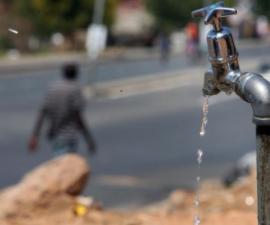
The Department of Water and Sanitation (DWS) has reassured Gauteng residents that water supply will not be affected during the closure of the Lesotho Highlands tunnel closure for maintenance.
Speaking at the recent City Meets Business Engagement Session, hosted by the City of Ekurhuleni, the Head of Department in Gauteng, Justice Maluleke, assured the public, including stakeholders in the water sector, that the department has taken all the necessary measures to ensure that water supply will not be affected by the closure of the tunnel, which will commence in October until March 2025.
“The main message is that we are ready for the tunnel closure and the public must not panic [as] we have all the plans in place, and we will be communicating,” Maluleke said.
According to Maluleke, the department is working with all stakeholders from Lesotho, including the Trans-Caledon Tunnel Authority (TCTA), Rand Water, City of Tshwane, City of Ekurhuleni, and the City of Johannesburg and entities to ensure that there is no water shortage in the province during the shutdown of the tunnel.
While Maluleke acknowledged that there may be challenges along the way, he expressed confidence in their preparedness to manage any obstacles that may arise.
“In a worst case scenario of shortage of water supply, the Integrated Vaal River System has 13 dams that supply water to the Vaal River system. This is only at the worst-case scenario when the Vaal dam is around 18%, but since the closure will be during the rainy season, we do not anticipate that that is going to happen,” Maluleke said.
Maluleke also reassured businesses that they have nothing to worry about and further advised them to build on-site storage facilities for water, in order to continue with their operations.
Celiwe Ntuli, Scientist Manager from System Operation at the National Department of Water and Sanitation, echoes Maluleke’s statement, stating that the analysis shows no risk of water shortage in the Integrated Vaal River System (IVRS).
During her presentation, Ntuli said Phase 1 of the Lesotho Highlands transfers 700 million cubic meters of water per year into the IVRS, whilst Phase 2 project will add 490 million cubic meters per year into the IVRS.
According to the treaty signed between Lesotho and South Africa in 1996, maintenance is required every five to ten years. The last maintenance was conducted in 2019 where the need for Phase 2 was discovered. – SAnews.gov.za


